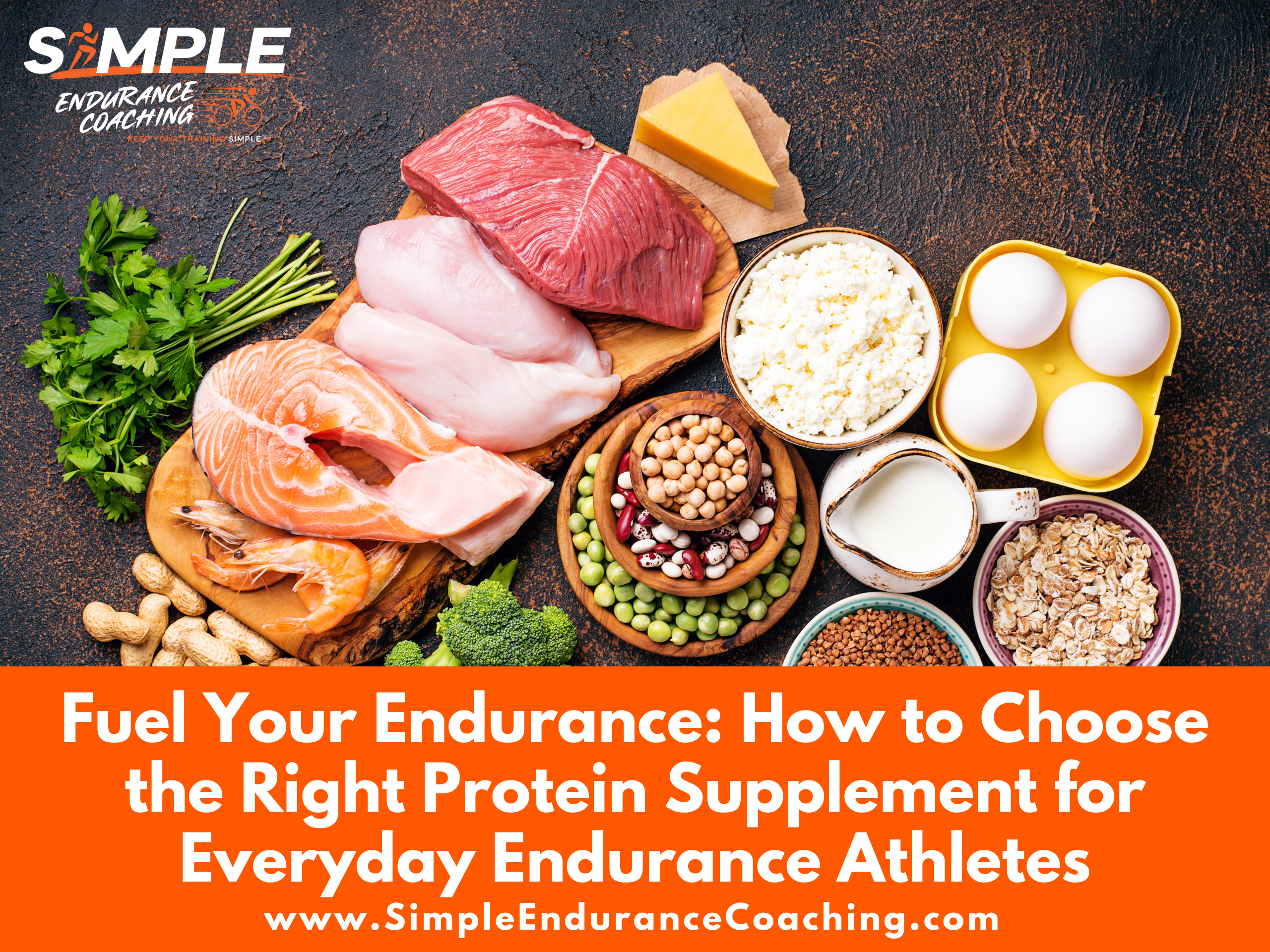Endurance athletes, like cyclocross racers, gravel racers, and trail runners, need roughly one gram of protein per pound of body weight per day.
Are you getting that much?
Consuming that much protein can be a challenge, and sometimes, drinking a protein supplement provides the necessary amount.
This article will be the first in a series about nutritional supplements that actually work to help you improve your performance.

Why endurance athletes need protein
During prolonged endurance activities like running, cycling, or swimming, muscle fibers undergo stress and micro-damage.
Protein is crucial for repairing these damaged fibers, which helps to prevent muscle breakdown and promotes recovery.
Plus, post-exercise protein intake helps muscle protein synthesis, which is the process of building new muscle tissue.
The effectiveness of a protein supplement can vary based on individual needs, preferences, dietary restrictions, and specific fitness goals.
I typically use common whey protein for its effectiveness and lower cost.
Here are some of the most popular and effective types of protein supplements, along with their benefits and potential drawbacks:
1. Whey Protein
Benefits:
- Complete Protein: Contains all essential amino acids.
- Fast Absorption: Quickly digested and absorbed, making it ideal for post-workout recovery.
- High Biological Value: High in leucine, which is crucial for muscle protein synthesis.
- Research-Backed: Extensive research supports its effectiveness in muscle growth and recovery.
Drawbacks:
- Dairy-Based: Not suitable for those with lactose intolerance or dairy allergies.
2. Casein Protein
Benefits:
- Slow Digestion: Provides a steady release of amino acids, making it beneficial for sustained muscle repair and growth, especially overnight.
- Complete Protein: Contains all essential amino acids.
Drawbacks:
- Dairy-Based: Not suitable for those with lactose intolerance or dairy allergies.
- Slow Absorption: Not ideal for immediate post-workout recovery.
3. Plant-Based Proteins
Common Sources: Pea, rice, hemp, soy, and blends of these.
Benefits:
- Vegan-Friendly: Suitable for vegetarians and vegans.
- Hypoallergenic Options: Some plant proteins, like rice and pea protein, are less likely to cause allergies.
- Fiber and Nutrients: Often contain additional fiber and nutrients from the plant sources.
Drawbacks:
- Incomplete Proteins: Some plant proteins lack one or more essential amino acids but can be combined to form a complete amino acid profile.
- Digestibility: Generally have lower digestibility compared to animal-based proteins.
4. Egg Protein
Benefits:
- Complete Protein: Contains all essential amino acids.
- High Biological Value: High in leucine and other essential amino acids.
- Lactose-Free: Suitable for those with lactose intolerance.
Drawbacks:
- Allergies: Not suitable for those with egg allergies.
- Cost: Can be more expensive than whey or plant-based proteins.
5. Collagen Protein
Benefits:
- Joint and Skin Health: Supports joint, skin, and connective tissue health.
- Digestibility: Easily digestible and generally well-tolerated.
Drawbacks:
- Incomplete Protein: Lacks some essential amino acids and is not ideal for muscle protein synthesis.
Beef Protein Isolate
Benefits:
- High Protein Content: Provides a concentrated source of protein, often with more than 90% protein by weight.
- Complete Protein: Contains all essential amino acids needed for muscle repair and growth.
- Lactose-Free: Suitable for those who are lactose intolerant or have dairy allergies.
- Digestibility: Hydrolyzed beef protein is often easier to digest and absorb compared to whole beef.
- Paleo-Friendly: Suitable for those following a paleo diet.
Drawbacks:
- Taste and Texture: Some users may find the taste and texture less appealing compared to other protein powders like whey or plant-based options.
- Cost: Beef protein isolate can be more expensive than other protein supplements.
- Allergies: Not suitable for those with beef allergies.
Choosing the Most Effective Protein Supplement
The most effective protein supplement depends on individual goals and dietary preferences:
- For Muscle Growth and Recovery: Whey protein is often considered the gold standard due to its fast absorption, complete amino acid profile, and high leucine content.
- For Sustained Protein Release: Casein protein is ideal for providing a slow, steady release of amino acids, beneficial for overnight recovery.
- For Plant-Based Diets: A blend of plant-based proteins (e.g., pea and rice protein) can provide a complete amino acid profile and is suitable for vegans and those with dairy allergies.
- For Lactose Intolerance: Egg protein and plant-based proteins are good options.
- For Joint and Skin Health: Collagen protein is beneficial, though it should be complemented with other protein sources for muscle synthesis.
Ultimately, the best protein supplement is one that aligns with your dietary needs, fitness goals, and any potential allergies or intolerances.
Beef protein isolate is a type of protein supplement derived from beef.
It is designed to provide a high-quality source of protein without the fat and cholesterol typically associated with beef.
Three things to know about choosing the right protein supplement:
- Endurance activities cause muscle stress and micro-damage, making protein essential for muscle repair, recovery, and maintaining lean muscle mass. Adequate protein intake supports overall performance and recovery in endurance sports.
- Whey, casein, plant-based, egg, collagen, and beef protein isolates each have unique benefits and drawbacks. The choice of supplement should align with an athlete’s specific goals, dietary preferences, and any potential allergies or intolerances.
- The best protein supplement varies based on individual needs, such as muscle growth, sustained protein release, or dietary restrictions.
Need more?
Unlock the secrets to mastering gravel racing with our FREE Guide to Gravel Racing! Get yours here.
BOOK A CALL so we can discuss your goals, answer questions, and talk about making your endurance training more effective, fun, and Simple.
Paul Warloski is a:
- USA Cycling Level 1 Advanced Certified Coach
- RRCA Running Coach
- Training Peaks Level 2 Coach
- RYT-200 Yoga Instructor
- Certified Personal Trainer
- Certified Nutrition Advisor




